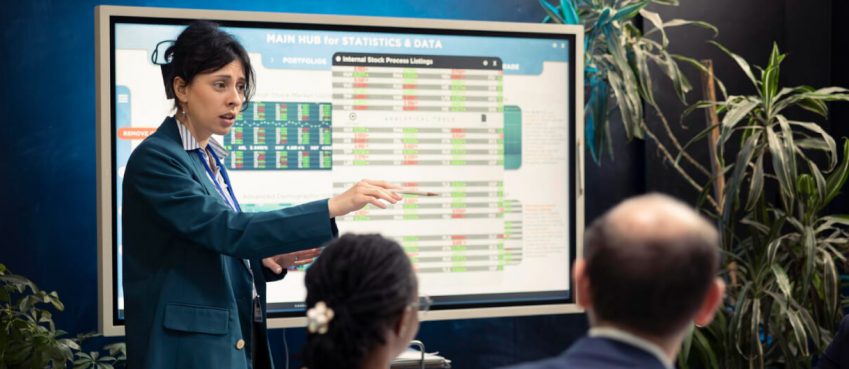
After the coronavirus pandemic, companies have changed their view of the usual organization of the workflow. The focus shifted from the place and time of work to the goal and result. Established models are transforming, giving way to new approaches. With this in the background, many companies see the future behind a hybrid model that combines remote and office work.
Remote work has fundamentally changed people’s perception of the role of work in their lives. Returning to the office is challenging. For example, in five major developed economies, the US, Germany, the UK, France, and Australia, in 2022, only a quarter to a third of office workers who worked remotely during the pandemic returned to the 5-day work week in the office.
Jobs with the option to work remotely receive 2.5 times more responses than similar job offers exclusively in the office. According to a Microsoft study in 31 countries conducted in early 2022, 52% of full-time office workers plan to work remotely over the next year, while almost the same proportion of employers, 50%, plan to bring all their employees back to the office. Managers worry that working from home reduces the efficiency of their subordinates.
Before the start of the pandemic, there was a strict division into “regular work” and “remote work.” Now businesses are looking for hybrid work, while employers have found that employees are in no hurry to return to their jobs. So far, the market has yet to form a unified approach to hybrid work. Each company builds forms in its own way, depending on the specifics of its business. The most optimal solution would be not formal compliance with the policy of “three days in the office, two days working from home” but maintaining a constant dialogue with employees and finding a mutually beneficial solution, whether it’s a startup team or big business.
Benefits and Challenges of Remote Work
More and more services are moving online, so more and more professions are moving to work online. And at this point, a logical question arises: “Why should I go to the office?” And this question is not only by the employees but also by the company management: “Why should I pay for an office if employees can work from home?”
Until 2020, working from home was more of a privilege. Small business and freelancing had their nuances, but if you worked in a large company and could not go to the office, you were lucky. There are people who not only do not lose productivity at home but also increase it by saving time.
Also read: 30+ Loan Apps Like MoneyLion and Dave: Boost Your Financial Emergency (Best Apps Like Dave 🔥 )Benefits and Challenges of Office Work
Firstly, employees want to separate work and personal time. As soon as you leave the office, you are not working. Also, some just want to work in the office due to increased productivity, lack of distractions, and communication with people, which is not enough at home. It is also worth considering that it is only sometimes possible to equip a workplace at home, which leads to the following problem: sitting on the couch all day and being productive is impossible. The cornerstone is self-motivation. At home, forcing yourself to do boring, incomprehensible tasks is more challenging.
Is There A Compromise?
As a result, we see that remote work is not a universal tool. It is only suitable for some employees and only for some tasks. Employees whose responsibilities are clear, whose tasks are well described, and whose solutions do not involve many meetings remain productive at home. Those with research, management, initiative and communication jobs are more likely to have trouble working remotely.
If you ask employees where they want to work, in the office or at home, most will say: “I want to be able to come to the office sometimes.” So we came to allow employees to go to the office as needed, but even here, everything is not so simple.
Although a “hybrid” is a step towards more flexible work in the future, it can include many variations. The whole point of hybrid work is to give workers the choice of when and where to work. Employees have more autonomy to work whenever they want, not just when they are strictly limited to office hours. Ideally, this is the best option: planning and communication on the one hand and independence and flexibility on the other.
Also read: 12 BEST Vocabulary Apps For Adults In 2024Hybrid Work and Its Challenges
You can not keep a spot in the office for each employee; it is wasteful. The phrase “To be able to come sometimes” most often means 2-3 times a month. Many employees, having the opportunity to go to the office, rarely do it. Here are the main problems of employees who do not want to go to the office:
- “I don’t know anyone there” Employee onboarding process is an important and complex topic, especially when working remotely.
- “There’s no one there” Sometimes, it’s better to tie employees’ visits to the office to events, general meetings, or parties. It is better to gather people in chats for those who want to find a company for going to the office. You can gather people in the office as a team for a specific task; later, this mechanism starts to work on its own, and employees self-organize.
- “Why would I?” The office should be a pleasant place. A good office used to be an advantage when looking for employees; now, it affects employees’ productivity. Let the office be smaller, but better for those who come there.
Conclusion
The hybrid format of the company’s work is a tool that can give many valuable things, both for the company and its employees. When used correctly, it can significantly reduce staff outflow and increase employee loyalty and productivity. But it needs to be used wisely, as it is only suitable for some.
Top 10 News
-
01
[10 BEST] AI Influencer Generator Apps Trending Right Now
Monday March 17, 2025
-
02
The 10 Best Companies Providing Electric Fencing For Busines...
Tuesday March 11, 2025
-
03
Top 10 Social Security Fairness Act Benefits In 2025
Wednesday March 5, 2025
-
04
Top 10 AI Infrastructure Companies In The World
Tuesday February 11, 2025
-
05
What Are Top 10 Blood Thinners To Minimize Heart Disease?
Wednesday January 22, 2025
-
06
10 Top-Rated AI Hugging Video Generator (Turn Images Into Ki...
Monday December 23, 2024
-
07
10 Top-Rated Face Swap AI Tools (Swap Photo & Video Ins...
Friday December 20, 2024
-
08
10 Exciting iPhone 16 Features You Can Try Right Now
Tuesday November 19, 2024
-
09
10 Best Anatomy Apps For Physiologist Beginners
Tuesday November 12, 2024
-
10
Top 10 Websites And Apps Like Thumbtack
Tuesday November 5, 2024







